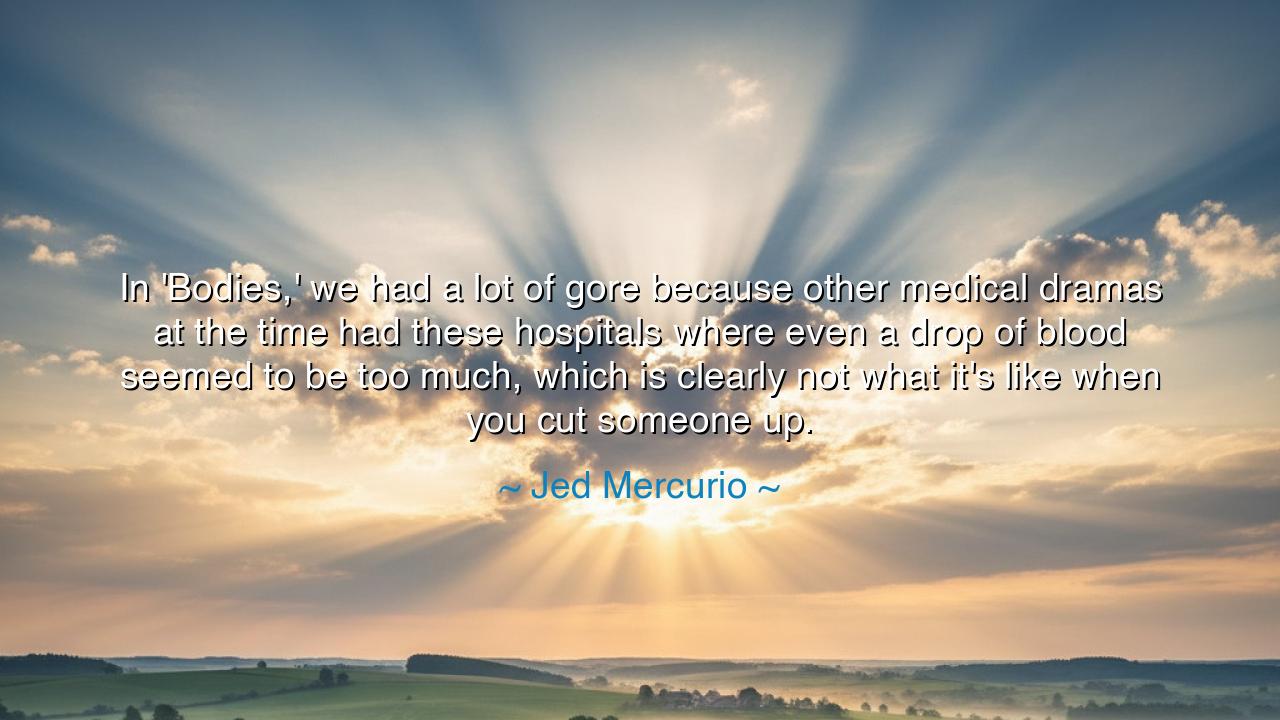
In 'Bodies,' we had a lot of gore because other medical dramas at
In 'Bodies,' we had a lot of gore because other medical dramas at the time had these hospitals where even a drop of blood seemed to be too much, which is clearly not what it's like when you cut someone up.






The words of Jed Mercurio—“In 'Bodies,' we had a lot of gore because other medical dramas at the time had these hospitals where even a drop of blood seemed to be too much, which is clearly not what it's like when you cut someone up.”—carry a truth both artistic and philosophical. Beneath their surface lies not a fascination with blood, but a reverence for reality, for the unfiltered truth of human existence. Mercurio, himself once a physician, understood that to portray the world of medicine without its visceral honesty was to betray its essence. In this reflection, he reveals not only his creative philosophy, but a universal teaching: that truth—however uncomfortable, however raw—must not be hidden, for it is only by confronting what is real that we learn compassion, courage, and understanding.
To grasp the depth of Mercurio’s words, one must look beyond the literal gore to what it represents. The medical world, with all its triumphs and tragedies, is not a place of polished surfaces and sterile perfection, but of struggle, of flesh and fragility. Life and death meet there without ceremony. Yet for years, popular media painted hospitals as temples of cleanliness and calm, where suffering was softened and blood was discreetly hidden away. Mercurio rejected that illusion. In Bodies, he tore away the veil and demanded that audiences look directly at what life and medicine truly are—messy, uncertain, and profoundly human. His “gore” was not indulgence; it was honesty. And in that honesty, he found art.
The origin of this philosophy lies in Mercurio’s early life as a doctor. Before he was a storyteller, he stood in the operating room, witnessing the real weight of healing—the blood, the pain, the urgency of decisions that separated life from death. He saw what most people never see: the sacred chaos of the body, the vulnerability of human beings in the hands of other human beings. When he turned to writing, he carried this truth with him. Bodies, his creation, was born from the belief that art must bear witness to truth, not beautify it into deceit. Just as a surgeon cannot turn away from the wound he must heal, an artist cannot turn away from the reality he must reveal.
This principle echoes through history. In the Renaissance, the great painter Caravaggio shocked the world with his stark depictions of suffering—saints and sinners rendered not as distant icons, but as real, bruised, imperfect men and women. His paintings were condemned as vulgar by those who preferred beauty to truth, but his legacy endured precisely because he refused to lie. Likewise, Mercurio’s realism in Bodies unsettled many who were accustomed to sanitized portrayals of medicine. But just as Caravaggio painted with darkness to illuminate the divine, Mercurio wrote with blood to illuminate humanity. His message was clear: to look away from what is painful is to look away from what is real.
There is, too, a moral force within his statement—a challenge to the spirit of denial that pervades not only art but life itself. In every generation, people are tempted to hide the difficult truths—to cover the scars of society, to pretend that suffering is distant. But Mercurio reminds us that authenticity requires courage. To confront the harshness of reality is not an act of cruelty but of compassion, for it is only by acknowledging pain that we can honor those who endure it. Just as a doctor cannot treat a wound he refuses to see, society cannot heal the wounds it refuses to face.
One might see this philosophy reflected in the lives of truth-tellers throughout time. Consider Florence Nightingale, who transformed modern nursing not by romanticizing it, but by revealing its horrors—the filth, the infection, the unnecessary deaths of soldiers ignored by the state. She faced resistance and disgust, yet her courage to show the unvarnished truth changed the world. Mercurio, too, walked in that tradition. Through his storytelling, he forced viewers to witness the reality behind the curtain—to feel empathy not for perfection, but for imperfection, for those who live and die in the uncertain balance between hope and despair.
From Jed Mercurio’s words, let us take a lesson that transcends medicine and art alike: do not hide the truth for the sake of comfort. Whether in storytelling, in work, or in the soul, honesty is the foundation of wisdom. To see clearly, even when what we see is unpleasant, is to honor the fullness of life. Let us not be afraid of the “gore” in our own existence—the failures, the fears, the brokenness—for it is through them that we discover what it means to be whole. The whitewashed image may soothe the eye, but only truth heals the heart.
Thus, Mercurio’s quote stands as both an artistic declaration and a spiritual teaching. It calls us to walk the harder path—the path of seeing, of acknowledging, of understanding. Whether we are healers, creators, or simply seekers of truth, we must remember that to confront the raw and the real is not to embrace darkness, but to shed light upon it. For in every drop of blood, every scar, every imperfection, there lives the undeniable proof of our shared humanity—and in that truth lies the deepest form of beauty.






AAdministratorAdministrator
Welcome, honored guests. Please leave a comment, we will respond soon